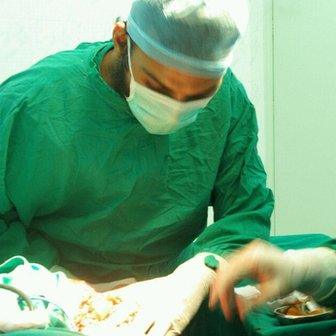Syria: Family of British doctor fears for his mental health
- Published
Abbas Khan's family say they feel he has been forgotten by the UK government
The family of a British doctor, imprisoned by the Syrian government for over a year, is growing increasingly concerned for his mental health.
Dr Abbas Khan, a 32-year-old orthopaedic surgeon from Streatham, south London, travelled to the city of Aleppo last year to help civilians.
He started work in a field hospital but was arrested by Assad regime forces.
His brother, Afroze, said Dr Khan was depressed. "There is a real possibility he may want to harm himself."
He was arrested within 48 hours of arriving in Aleppo to work as an emergency surgeon, and his family lost all contact with him for months, unsure whether he was still alive.
Held without charge
Dr Khan's mother, Fatima, travelled from London to track down her son - a surgeon at the Royal National Orthopaedic Hospital in London - earlier this year and found him in a prison in Damascus, external, weighing just five stone (32kg) and barely able to walk.
He claimed he had been tortured while in custody - where he is being held without charge - and held for much of the time on his own.
He said that at a recent hearing he had been "accused of treating dying civilians, (women and children), which has been classed as an act of terrorism".
Dr Khan's sister, Sara, said: "It's been very difficult for the family. For six months we did not know if he was alive. It's tough to answer questions from his wife and his two children, like, 'where is Baba' and 'why hasn't he come home?'"

Dr Khan hoped to help as an emergency surgeon in war-torn Aleppo
She added: "We are extremely worried about his mental state. He's been in Syria for over 12 months - for eight months of that he was in solitary confinement.
"To be away from your family for so long, to not have any real contact with the outside world, it must be very difficult for him. We have no idea how he is managing to cope, both physically and mentally."
Dr Khan's family has shown the BBC copies of two letters that he wrote in detention and gave to his mother, to pass on to Foreign Secretary William Hague.
'Squalid' conditions
In them he described being tortured in custody and said he was suffering from "deteriorating mental health".
In the first letter to Mr Hague, he wrote: "My detention has included repeated and severe beatings, largely for no reason other than the pleasure of my captors.
"In addition I have been violently forced to beat other prisoners, kept in squalid conditions, denied access to toilets or medical treatment.
In his most recent letter Dr Khan wrote: "Being kept in appalling and inhuman conditions has seen my mental health markedly deteriorate, I suffer from almost constant depression and suicidal ideation."
Dr Khan, who has a six-year-old son, Abdullah, and a daughter, Rurayya, who is seven, has been held in prisons that fall well below international standards.
Kristyan Benedict, Amnesty International's UK Syria campaign manager, said: "We at Amnesty have documented a whole range of ill treatment and torture in prisons within Syria.
"At a very basic level, you are talking about very dark, damp places, isolated, rat-infested, lice-infested, minimal access to legal representation, to medics themselves and consular services. These are hell-holes that detainees are being held [in] in Syria."
The Foreign Office told the BBC that Mr Hague had received Dr Khan's correspondence, but the family said they were disappointed he had not acknowledged repeated requests to meet him to discuss the case.
'Abandoned' by government
Afroze Khan said: "We've asked for the last 12 months to have an audience with Mr Hague, but we have not received a response on that issue.
"It's very frustrating. We are British citizens, and in our time of need the British government has forsaken us. My brother has been abandoned by his government. It's very disappointing."
The Foreign Office said Mr Hague was "following the case closely".
A spokeswoman said: "Despite having no diplomatic relations with Syria since the authorities confirmed Dr Khan's detention, we have been pressing them to allow consular access for our partners to ensure access for a lawyer and to provide information about any charges against him.
"The British government is extremely concerned about Dr Khan's ongoing detention. For some time we have advised against all travel to Syria, where all UK consular services are suspended. This means that our options for supporting British nationals there are limited."
Dr Khan's family is trying to stay hopeful that he will be able to return to London soon.
Sara Khan said: "The main focus for the family is get him home, back to his wife and children who love and cherish him."
Listen to more on this story on BBC Asian Network on Thursday December 12 at 13:00 GMT and 17:00 GMT
- Published12 November 2013